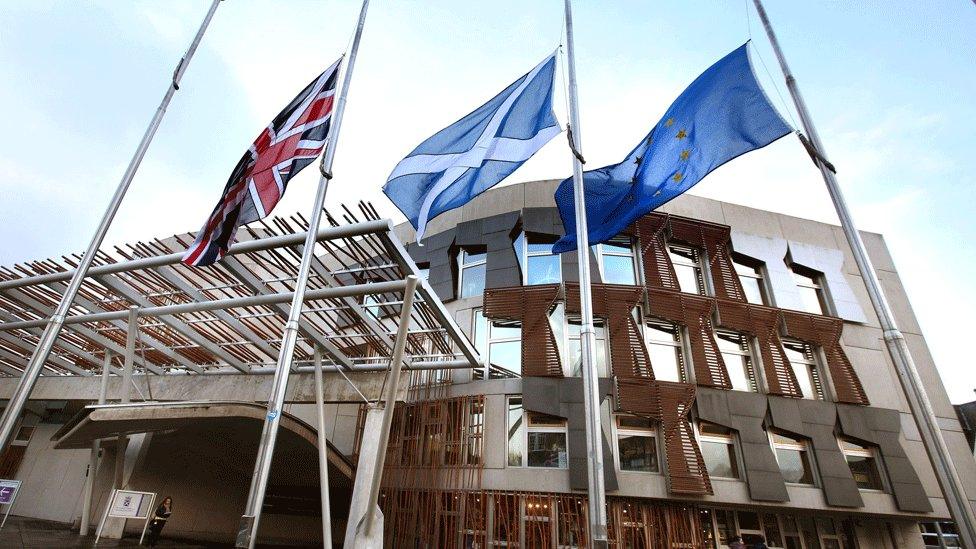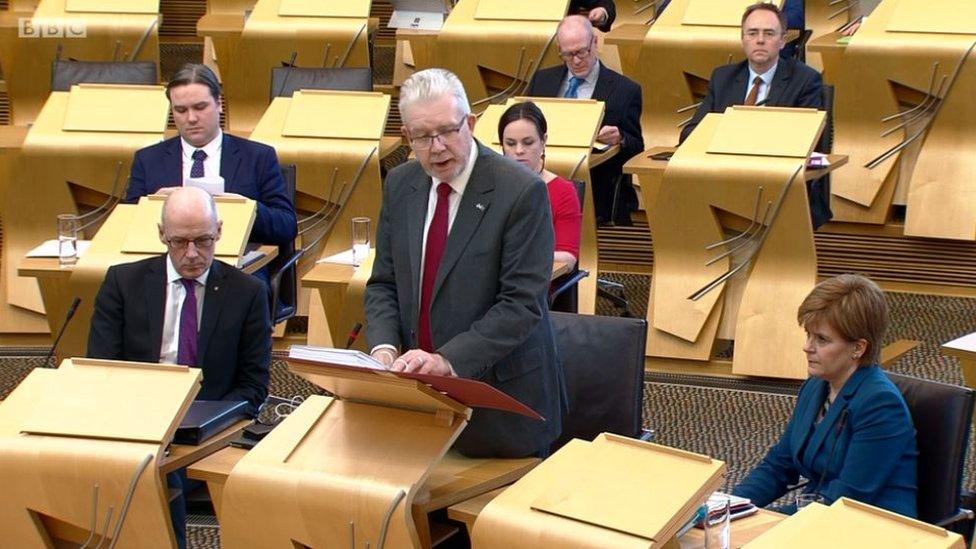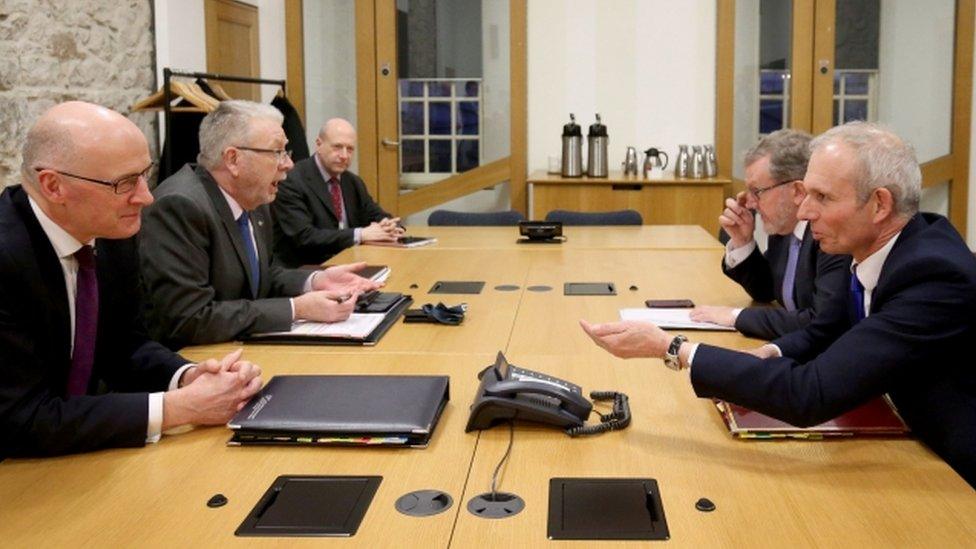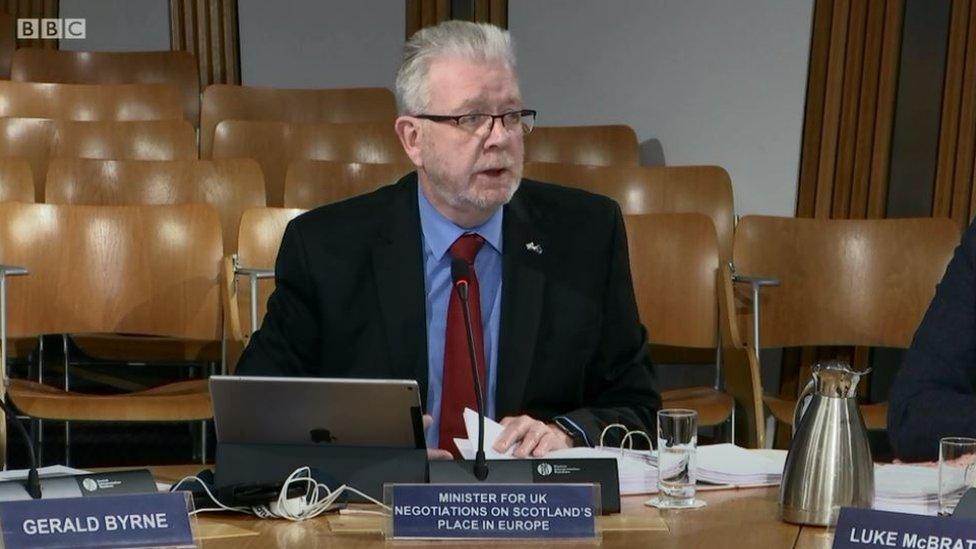Holyrood Brexit bill passes first vote
- Published

The Scottish government's stop-gap Brexit legislation has passed its first vote at Holyrood.
Ministers have put forward their own "continuity" bill amid a row with the UK government over the Westminster EU Withdrawal Bill and post-Brexit powers.
Scottish Brexit minister Mike Russell said he was "regretful" that the bill had to go ahead, but said it was "a job that has to be done".
MSPs passed the continuity bill at stage one by 94 votes to 30.
The Scottish and Welsh governments are both pushing ahead with their own Brexit legislation, as a row with UK ministers over post-Brexit powers rumbles on.
Representatives will meet in London on Thursday for the latest joint ministerial council, with both sides insisting they are still working hard to come to an agreement over how to set up UK-wide frameworks of devolved powers currently exercised from Brussels.
Ministers from the devolved administrations say they will not put forward the EU Withdrawal Bill for consent votes in Edinburgh or Cardiff until changes are agreed on this front, and are working on their own stop-gap legislation in the meantime.
Mr Russell told MSPs he was "regretful" that MSPs had to consider the legislation at all, but said it was a necessary move with no sign of an agreement with the UK government.
He said there was a "crucial issue of principle" still dividing the two sides, but said he was working "imaginatively and cooperatively" to find a solution and was "hopeful" of getting a result. However, he said MSPs must "stand up for the rights of this parliament" and not "trade away" its powers.
Mr Russell said he was "open to discussion and debate" over amendments to the bill, and pledged to allow members as much scrutiny as possible despite the emergency timetable.
He said: "I'm confident the bill will receive extensive scrutiny in the time available - the government will and should find that a challenging process, and we will face up to it. The first step is taken today."

Mike Russell told MSPs that the legislation was going ahead in "challenging circumstances"
Scottish Tory constitution spokesman Adam Tomkins said the "wrecking bill" would "sow the seeds of confusion, even chaos", and said it "threatens to wreck the negotiations" with the UK government.
Mr Tomkins called the bill seriously flawed, ill-thought-through, unnecessary and "incompetent, and all Scottish Tory MSPs ultimately voted against it. He said the EU Withdrawal Bill was "the right vehicle" for Brexit legislation, saying that while it was "flawed", the UK government had "undertaken to amend" it.
And he suggested that Mr Russell, by noting that "these are not normal times", had himself nullified the Sewell convention - that Westminster will not normally legislate on devolved areas without consent.
'Profound disappointment'
Labour's Brexit spokesman Neil Findlay urged Scottish and UK ministers to "get your people back around the table" to sort out the issue, so parliament could get back to considering issues that the people "see as a priority".
He accused the SNP of "using Brexit as another means of creating division" between Scotland and the UK with the ultimate aim of independence, and said the Tories had "made a mess" of devolving powers to Holyrood.
Other Labour members voiced reservations about the legislation and "profound disappointment" with the fact it was needed, but ultimately voted in favour of it at decision time. They said they would seek to make amendments in later stages.
The Scottish Greens and the Lib Dems also backed the bill, although MSPs again voiced concern over some provisions.
Green co-convener Patrick Harvie said the UK government had failed too many times to trust that they would come up with an acceptable change to the EU Withdrawal Bill in time, while Lib Dem Tavish Scott stressed the need for an agreement on post-Brexit powers.

Talks between ministers from the UK government and devolved administrations will continue on Thursday
Concerns were raised during the debate about "very significant" powers which ministers would take on under the legislation, allowing them to propose a mirroring of EU laws post-Brexit to maintain "regulatory equivalence" with European regulations.
Holyrood's finance committee discussed whether this would represent a "power grab" by the government from the parliament itself, with witnesses saying it was "rather curious" that ministers should hold this power, rather than the parliament.
Professor Alan Page told members he would be "frankly astonished" if the parliament "surrendered" some of its competence to ministers - but Mr Russell insisted that there would be strong scrutiny of any use of the "practical" powers, which would ultimately have to be signed off by MSPs.
Lib Dem MSP Mike Rumbles said parts of the bill were "an assault on the powers of this parliament", leading Mr Russell to invite him to bring forward amendments in later stages.
With the stage one vote complete, any amendments will be considered on Tuesday, 13 March. Members will debate them in the chamber before they are voted on in a late sitting of the finance and constitution committee.
The final vote of all MSPs on the continuity bill will then follow on 21 March, meaning the law could be on the statute book before the EU Withdrawal Bill itself is passed.
- Published6 March 2018

- Published1 March 2018
